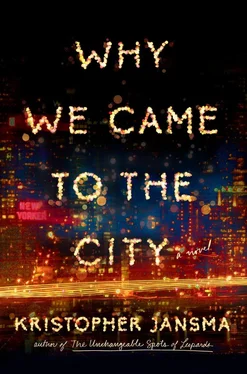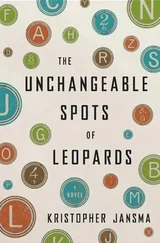But now the great gray fortress stood indifferent to Jacob’s return. He kept his eyes downcast on the slush-eaten driveway, wary of slipping and breaking his neck. The ducks had all gone south, and the iced-over pond was an opaque prison to last year’s leaves and the trash that had blown over from the Chinese Boys Academy across the way. Jacob paused beside it, trying not to feel cold and trying to think how exactly it had all come to this.
He’d gotten the job mainly because of his size — of that he was certain — and he’d accepted because being a poet wasn’t exactly lucrative. He remembered a professor, the hoary poet Penn Hazelwood, once telling their class, “Stop any guy on the street and ask him for the name of any living poet. Nine out of ten of them will say ‘Robert Frost’ or ‘Shakespeare’ or someone who’s been dead for decades or centuries. The other one will say ‘Billy Collins.’ And that’s the ball game, chowderheads. Sorry to drag you into this mess.”
From his spot beside the pond, Jacob closed his eyes and with no effort at all, summoned an image of Irene just seconds after she’d died. He’d never seen that kind of pale before. What skin looks like without any blood left beneath it. Easy to remember, hard to think about. But from this memory he could rewind to the moments just before she’d died, when he had, true to form, gotten the last word in. He’d sneaked up to her bedside while the nurses were increasing her morphine drip and preparing to remove the breathing tube, and he’d whispered in her ear before “they” eased him out of the way again. He swore he’d seen the corners of her lips creak up.
To Sara, he reported that he’d told Irene that, in her hospital gown, she was the spitting image of Grace Kelly in Rear Window. To George, he’d said that he had finally confessed to completely forgetting to water her plants when she’d gone upstate three summers earlier. But these had both been lies. As far as he was concerned, only two people needed to know what he’d actually said, and he was the only one left.
Inside, at least, Anchorage House was warm, and the combination wheel to his locker felt familiar under his fingertips: 3–8–25. Orderly whites had been hanging there since November. Still a faint smell of bleach. In the men’s room, the same old graffiti — a three-inch hirsute penis, a misspelled Young Jeezy lyric, an offer for a good time if bibjguy4you@msn.com was contacted. In his clean white uniform, he felt like a new person, freshly born, rather than someone who had, forty days ago, watched his friend die.
The door to Ward III was keycard-locked, but just past it the door to Oliver’s office was always open to both patients and staff. Because no one at work knew they were dating, Jacob fired off a casual “Hey, Dr. B,” while barely tapping the door frame. Inside, Oliver was chatting with Sissy Coltrane, head of art therapy, but instead of repeating Jacob’s “Hey!” Oliver froze as if he’d seen a ghost. Sissy turned, eyes wide. Jacob had spent enough time talking crap behind other people’s backs to see he’d just caught them speaking about him.
“You’re back!” Sissy chirped, rushing to the door, her arms extended inside a scratchy, sleeveless wool sweater. It was like being hugged by a bird’s nest.
“We’ve missed you! Oliver said you were with your poor friend in the hospital! That can be so tough. My mother had this operation on her rotator cuff once, and she was in bed for six weeks. I mean, I’m still reliving it. Terrible. Anyway, I hope everything worked out okay—”
She kept talking, but Jacob was more intent on glaring at Oliver than listening. He had told Sissy about Irene, this much was clear. But had he not then also told her that Irene had died?
Oliver mouthed a helpless apology behind Sissy’s back, making that look he always made. For how would he know that kind of personal information?
Jacob didn’t know what to say. Sara had been the one to call people, afterward. Then she’d posted this kind of creepy announcement onto Irene’s Facebook wall, prompting distraught replies from “friends” who hadn’t actually spoken to her in half a decade. Long, memorial messages filled with frowny faces and little hearts. Jacob had read every entry, waiting to be really nailed. Why not? Everyone else was crying all over the place. Even George was sniffling as he’d helped him snip obituaries out of all the newspapers Sara had notified. But Jacob had just sat there scissoring, quietly inhuman, as he stood now in Oliver’s doorway, Sissy’s eyes already beginning to leak.
“Yeah. It wasn’t — it didn’t — she didn’t end up making it.”
At least Sissy released him from her hug, as she turned to Oliver, horrified.
Oliver looked worried, as if Jacob were a giant mess of wires and plastic explosives that he’d just deliberately kicked. But Jacob had been getting this look from nearly everyone since it happened. They expected him, of all people, to lose his ever-loving shit. It was, after all, what Jacob Blaumann always did. But they didn’t see — there was no “always” anymore. Sara, George, Oliver, his own mother — everyone had told him once or a dozen times to just let it out. It’s okay to be upset! Pitch a fit, pound some walls, you’ll feel better. But surely he owed Irene more than that. He could hold on to this thing for however many years he had left. Long, long after everyone else had forgotten, he would remain Irene’s cold, stone memorial. So all he did was say thank you politely — and, he hoped, not crazily — before walking away.
FEBRUARY
Jacob was assigned to monitor Dr. Feingold’s eight-thirty a.m. group, which met in the common area — a few worn couches facing each other, a couple of easy chairs facing the windows. Jacob sat in the corner by the board games as the assembled patients named their greatest fears.
“Being alone,” said Jane with the Seconal-dead eyes.
“Polka dots,” called Annabeth, bulimic, at one point down to a mere eighty-seven pounds.
Jamal coughed and said, “Falling? Like off of a really high building or something?”
Dr. Feingold nodded in amicable fascination at each offering, as if it were both astute and deeply informative. He pointed his pen tip at a girl with glasses so thick they looked as if they could melt pennies in strong sunlight. Dr. Feingold always went around the circle in group therapy counterclockwise. Yet her hand was raised — five bitten fingernails confidently aimed at the ceiling. Jacob didn’t recognize her, but that didn’t mean she was new.
Corporate policy advised against fraternizing with the patients. A patient might try to use personal information. They were always wheeling and dealing for better food, private rooms, supervised trips outside. He couldn’t be bonding with them over their favorite films one minute and the next tackling them to the floor when they became gripped in a delusion that gorillas sent by their stepfathers had come to sell their kidneys on the black market.
But this girl didn’t seem that crazy. With seriousness that Jacob didn’t doubt, she said, “My greatest fear is dying without accomplishing anything important at all.”
Others in the group rolled their eyes quietly. “Thank you, Ella. That’s very brave,” the doctor said kindly.
Ella lowered her hand and folded it in her lap calmly. She turned politely toward the boy next to her, as he began speaking about his fear of scorpions.
Something about the girl bothered Jacob. Normally it was easy to pinpoint, as everyone in Anchorage House was off in some fairly obvious way: train-track scars on their wrists, vomit-stained yellow teeth, hair patchier in places where it had once been pulled out. Jacob knew whose tired eyes came from the morning’s dose of Xanax and which type of arm itching was a bad reaction to Ativan. But he couldn’t see anything obviously broken about this girl — Ella Yorke, according to his roster. She was sitting up straight, while everyone else slumped. She was smiling patiently, but not with the halcyon glistening of antianxiety drugs or the defensive smirking of the sarcastically imprisoned. As she nodded her head in empathy with the scorpion boy, the realization rolled slowly toward Jacob like a Tiananmen tank: hers was an actual smile. It felt like years since he had seen one.
Читать дальше












